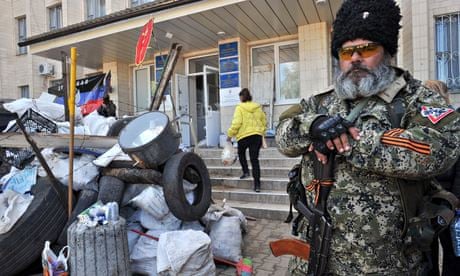A day after intense fighting in eastern Ukraine, the region remained on the brink of civil war as a diplomatic initiative to end the confrontation floundered, with Russia insisting that the rebels holding much of the south and east of the country should be included in talks on equal terms with the Kiev government.
The French president, François Hollande, warned that "chaos and the risk of civil war" were looming in Ukraine, while the German foreign minister, Frank-Walter Steinmeier, said "we are not far from a military confrontation".
Nato's top commander, General Philip Breedlove, said that Nato will have to consider permanently stationing troops in eastern Europe as a result of the increased tension. "I think this is something we will have to consider and we will tee this up for discussion through the leaderships of our nations to see where that leads." He added it was important to note that these measures were defensive and not intended to provoke Russia.
The Ukrainian army's attempts to regain control of the east of the country, termed an "anti-terrorist operation", is partly meant to prevent a referendum on secession from going ahead on Sunday in the Donetsk and Luhansk regions, but has already led to casualties on both sides in Slavyansk, the most fortified rebel stronghold.
In Slavyansk, shocked locals picked their way through the mess outside their homes, discovering broken windows, pools of blood and bullet-riddled fences a day after vicious fighting.
"They just came and started shooting at us. There was no warning," one Slavyansk resident said. "Look, everything is destroyed." Most residents appear to blame the Ukrainian army for the violence. "They [the rebels] are peaceful people, they never shot anyone and now these fascists come and try to kill us," one woman said.
Four Ukrainian soldiers were killed during the confrontation. Rebels also reportedly shot down a helicopter, the third to have been felled in the past three days.
A spokesperson for Slavyansk's self-appointed people's mayor, the local rebel leader Vyacheslav Ponomarev, said the militia body count stood at 10, with another 17 seriously wounded.
One bystander was reported to have been shot and killed in the crossfire while smoking a cigarette on her balcony on Monday. The civilian death follows that of 21-year-old nurse Yulia Izotova, who died after being hit by a stray bullet during clashes three days ago.
Slavyansk residents are now bracing for what seems to many an inevitable war on their doorsteps. "We are very anxious," said 27-year-old Aleksander as he visited his local shop to stock up on provisions with his three-year-old daughter. "Shops are selling out of food. People can't work. Life has stopped."
But as the Ukraine army edged forward into Slavyansk, the pro-Russia militia groups appeared to be making gains on another front. In nearby Donetsk, the regional administrative headquarters, gunmen are now operating openly on the street, a distinct change from a week ago. Nearly all state buildings and some private businesses in the city have been seized.
With most of the state security buildings in the region captured by local militia there was no resistance from law enforcement officials. On Monday, a group of armed men appeared to attempt to seize a local military training school but later withdrew after some negotiations. A cache of arms might be stored inside.
In Odessa, the number of fatalities during last week's violence looked set to rise, with local media speculating that the final death toll could be over 100.
The official figure for those killed in the clashes between pro-Ukraine groups and pro-Russia activists currently stands at 46. Local police refused to rule out that more deaths could be confirmed. An investigation with the assistance of experts from Europe and Israel was ongoing, said Odessa's new police chief Ivan Katerinchuk.
The government in Kiev intensified its efforts to reassert control, with the appointment of a new governor and the arrival of national guard units from Kiev.

Comments (…)
Sign in or create your Guardian account to join the discussion